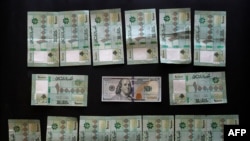Protesters burned tires and blocked roads in Beirut Tuesday as the Lebanese currency crashed past a new milestone.
Market dealers said the Lebanese pound was trading at about 15,000 to the dollar, having lost a third of its value in the last two weeks to stand at barely one-10th of what it was worth in late 2019, when Lebanon's economic and financial crisis erupted.
Banks have blocked access to dollar deposits, and poverty is spreading - but fractious politicians have yet to launch a rescue plan that could unlock foreign aid.
"Let them wake up now. Please have mercy on us, we're begging you!" said one protester, Hussein Makieh. "Look at us, we're starving. We're dying. The middle class is gone. There's 3% of the country, the thieves, living off it."
Parliamentary committees discussed an emergency loan for the state-run electricity company after the energy minister warned that, without more money, the lights would go out across Lebanon by the end of the month.
The lawmakers only managed to promise $200 million out of a requested $1 billion, and that amount now needs parliament's approval to go through.
The caretaker prime minister, Hassan Diab, said there were efforts to secure credit as fuel for electricity generation was running out. He also said subsidies on basic goods were covered until June.
The prospect that those subsidies could be scrapped has sparked fears of rising hunger and warnings of catastrophe from the United Nations.
An official source who declined to be named told Reuters that $1 billion to $1.5 billion remained in the pot for subsidies, which cover items including wheat, fuel and medicine. The source said foreign reserves now stood at roughly $16 billion, compared to a central bank estimate of $19.5 billion in August.
Lebanon's already dire predicament deepened last August when a blast at Beirut's port devastated large parts of the city, killing 200 people and prompting Diab's cabinet to resign. But his designated successor, veteran politician Saad al-Hariri, is at loggerheads with President Michel Aoun and has yet to form a new government, which must carry out reforms before it can unlock foreign aid.
"We're absolutely sick of this!" yelled one protester, standing near a barricade of garbage trucks and bonfires blocking a road in the capital. "We're hungry - we're finished!"
Lebanon's Protesters Back on Streets as Currency Hits New Low
- By Reuters





